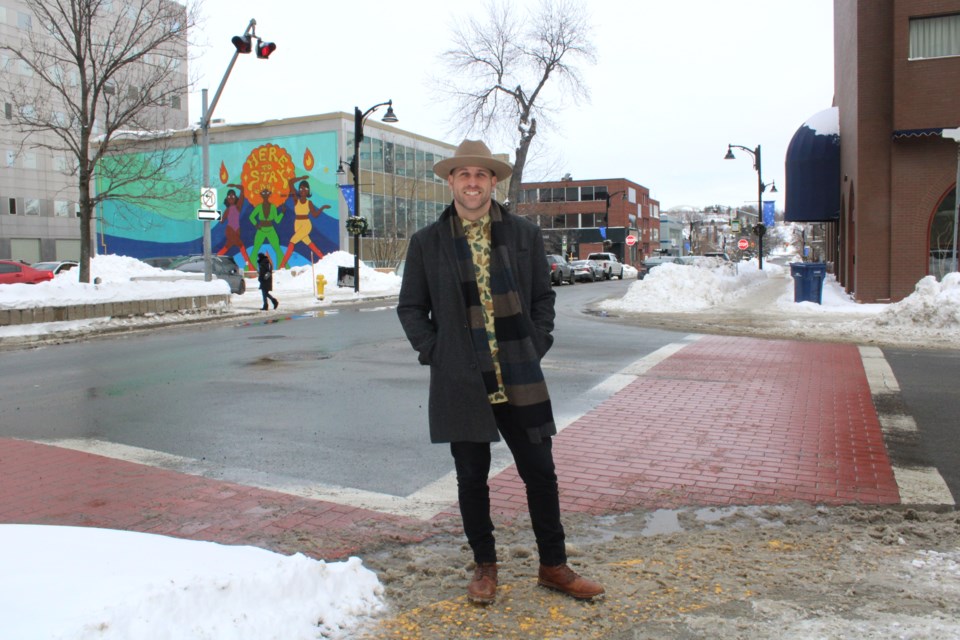Counting 21 new businesses in the city’s downtown core since the province ramped up COVID-era reopening efforts in early 2021, it appears to be on a clear road to recovery.
So described Downtown Sudbury Business Improvement Area managing director Kyle Marcus, who said downtown streets are a far cry from the vacant landscape of 2020, when the province’s pandemic response was at its peak.
“It was depressing to see the empty streets,” he said, declaring that people have since returned.
The 21 new businesses, minus three closures, yields a net business gain of 18, Marcus said, adding the newcomers are helping change the downtown business landscape. An additional three businesses expanded in the past year.
“I think what we’re doing is growing our identity more, we’re growing culturally more,” he said, citing as evidence a number of ethnic restaurants alongside cultural spaces, such as Place des Arts and the Refettorio outdoor theatre under construction and expected to open this year.
“I really like the cultural aspect that’s coming, the diversity that’s coming, and where that’s going to position us in the future.”
New businesses include Peko Peko, Books & Beans, Kulta Vintage, Makami Engineering, BusinessKasual, Amberhill Gallery, Ranvee’s Eatery, Popular Pizza, The Nori Gallery, The Gory Hole, PHO Noodle House, Ravens Rising Chocolatier, Gingersnap Salon, White Rabbit Tattoo Studio, Nightowl.vip, Place des Arts & Le Bistro, Nourish, NOBEEP, The Regional Business Centre’s Innovation Quarters, Elgin Street Pharmacy, as well as the Sudbury Wolves SWSE administration offices.
One of the most significant investments in recent months has been at the old Northern Life building building at 158 Elgin St., which a trio of investors purchased and renovated. This resulted in the creation of space for a basement coffee shop and speakeasy bar, main-floor hair salon and tattoo shop, and an architecture company on the second floor.
In early December, Canadian Chamber of Commerce chief economist Stephen Tapp delivered a presentation in Copper Cliff at which he said the city’s downtown core has been lagging behind the balance of the city when it came to people returning to in-person work.
By that time, mobility to the work place was down seven per cent from pre-pandemic levels in Greater Sudbury, and down 32.7 per cent in the city’s downtown core.
Although unable to comment on these numbers, Marcus said the full coffee shops downtown lately point to people returning to work and sticking around downtown during their off time.
“They’re full again and it’s wonderful,” he said. “I feel like we did OK.”
Despite a few notable exceptions, including the Cedar Street parking garage, the old Roy’s furniture store across from the YMCA, and the Ledo Hotel building, Downtown Sudbury has made strides in filling vacant spaces through the Zero Vacancy/Meanwhile Spaces program.
The program encouraged landlords to rent out spaces at cost to startups during the pandemic, and concluded after all the spaces were rented out. They started out with five spaces, and have since permanently rented out approximately nine.
While gains have been made in attracting new businesses to the city’s downtown core, Marcus said that Downtown Sudbury also remains committed to altering the public’s perception of the neighbourhood.
“Everyone’s entitled to their feelings and opinions, but I just want people to know that opinions aren’t necessarily rooted in fact,” he said.
“Everyone is chasing that small business dream down here, everyone works hard and takes care of one another,” he said, adding that Downtown Sudbury has declared 2023 the “year of promotion” to share what’s going on downtown with the broader community.
The coming year will also see the continuation of the Clean-Up Program, in which people sponsor members of the city facing employability challenges to help clean up downtown for a $10 per hour honorarium. The group also plans on introducing a Welcoming Streets Initiative this year, similar to a program in Guelph, in which two full-time outreach staff will be hired to assist both vulnerable people and the downtown business community.
“If someone is having a mental health crisis on my patio ... let’s get someone trained in de-escalation,” said Marcus, who owns The Alibi Room. “All of these calls don’t need to go to the police. We can get someone who’s trained appropriately.”
Downtown Sudbury is still looking to firm up some details before Greater Sudbury’s version of a Welcoming Streets Initiative can start up, but Marcus said the goal is this year.
Meanwhile, this summer’s patio season is expected to see approximately 20 patios open to diners again, an art installation is being planned with the McEwen School of Architecture, and two major potential downtown projects are on the horizon with the Junction East Cultural Hub (new central library/art gallery) and a new or renewed Sudbury Community Arena. Both projects rely on future city council approval.
“I love them both,” Marcus said of the two projects, describing Junction East as a “cultural epicentre,” and the arena as serving a similarly important function in the community.
“Hockey is ingrained culture in this community,” he said, adding that he’s eager to see both projects advance.
Tyler Clarke covers city hall and political affairs for Sudbury.com.
